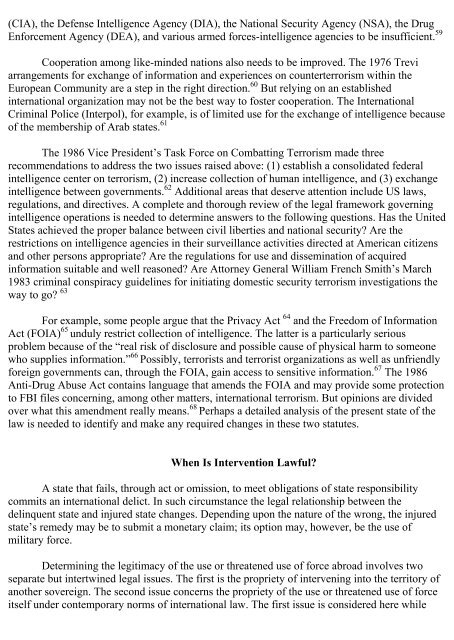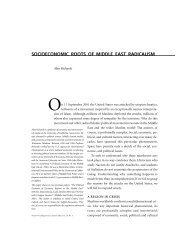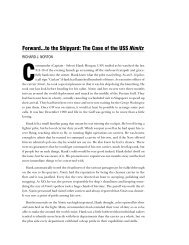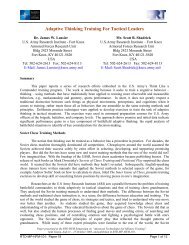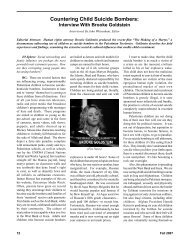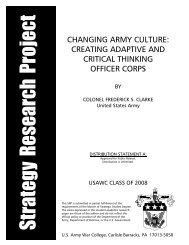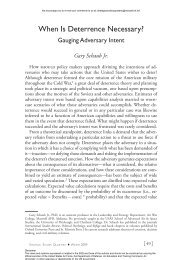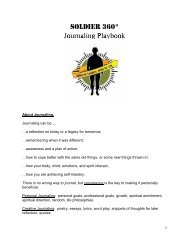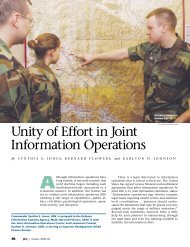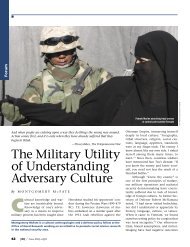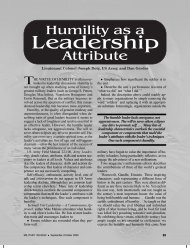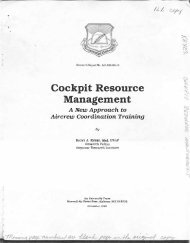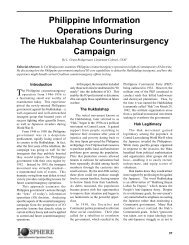Legitimate use of military force against state-sponsored - Air University
Legitimate use of military force against state-sponsored - Air University
Legitimate use of military force against state-sponsored - Air University
Create successful ePaper yourself
Turn your PDF publications into a flip-book with our unique Google optimized e-Paper software.
(CIA), the Defense Intelligence Agency (DIA), the National Security Agency (NSA), the Drug<br />
En<strong>force</strong>ment Agency (DEA), and various armed <strong>force</strong>s-intelligence agencies to be insufficient. 59<br />
Cooperation among like-minded nations also needs to be improved. The 1976 Trevi<br />
arrangements for exchange <strong>of</strong> information and experiences on counterterrorism within the<br />
European Community are a step in the right direction. 60 But relying on an established<br />
international organization may not be the best way to foster cooperation. The International<br />
Criminal Police (Interpol), for example, is <strong>of</strong> limited <strong>use</strong> for the exchange <strong>of</strong> intelligence beca<strong>use</strong><br />
<strong>of</strong> the membership <strong>of</strong> Arab <strong>state</strong>s. 61<br />
The 1986 Vice President’s Task Force on Combatting Terrorism made three<br />
recommendations to address the two issues raised above: (1) establish a consolidated federal<br />
intelligence center on terrorism, (2) increase collection <strong>of</strong> human intelligence, and (3) exchange<br />
intelligence between governments. 62 Additional areas that deserve attention include US laws,<br />
regulations, and directives. A complete and thorough review <strong>of</strong> the legal framework governing<br />
intelligence operations is needed to determine answers to the following questions. Has the United<br />
States achieved the proper balance between civil liberties and national security? Are the<br />
restrictions on intelligence agencies in their surveillance activities directed at American citizens<br />
and other persons appropriate? Are the regulations for <strong>use</strong> and dissemination <strong>of</strong> acquired<br />
information suitable and well reasoned? Are Attorney General William French Smith’s March<br />
1983 criminal conspiracy guidelines for initiating domestic security terrorism investigations the<br />
way to go? 63<br />
For example, some people argue that the Privacy Act 64 and the Freedom <strong>of</strong> Information<br />
Act (FOIA) 65 unduly restrict collection <strong>of</strong> intelligence. The latter is a particularly serious<br />
problem beca<strong>use</strong> <strong>of</strong> the “real risk <strong>of</strong> disclosure and possible ca<strong>use</strong> <strong>of</strong> physical harm to someone<br />
who supplies information.” 66 Possibly, terrorists and terrorist organizations as well as unfriendly<br />
foreign governments can, through the FOIA, gain access to sensitive information. 67 The 1986<br />
Anti-Drug Ab<strong>use</strong> Act contains language that amends the FOIA and may provide some protection<br />
to FBI files concerning, among other matters, international terrorism. But opinions are divided<br />
over what this amendment really means. 68 Perhaps a detailed analysis <strong>of</strong> the present <strong>state</strong> <strong>of</strong> the<br />
law is needed to identify and make any required changes in these two statutes.<br />
When Is Intervention Lawful?<br />
A <strong>state</strong> that fails, through act or omission, to meet obligations <strong>of</strong> <strong>state</strong> responsibility<br />
commits an international delict. In such circumstance the legal relationship between the<br />
delinquent <strong>state</strong> and injured <strong>state</strong> changes. Depending upon the nature <strong>of</strong> the wrong, the injured<br />
<strong>state</strong>’s remedy may be to submit a monetary claim; its option may, however, be the <strong>use</strong> <strong>of</strong><br />
<strong>military</strong> <strong>force</strong>.<br />
Determining the legitimacy <strong>of</strong> the <strong>use</strong> or threatened <strong>use</strong> <strong>of</strong> <strong>force</strong> abroad involves two<br />
separate but intertwined legal issues. The first is the propriety <strong>of</strong> intervening into the territory <strong>of</strong><br />
another sovereign. The second issue concerns the propriety <strong>of</strong> the <strong>use</strong> or threatened <strong>use</strong> <strong>of</strong> <strong>force</strong><br />
itself under contemporary norms <strong>of</strong> international law. The first issue is considered here while


